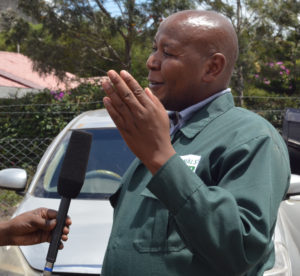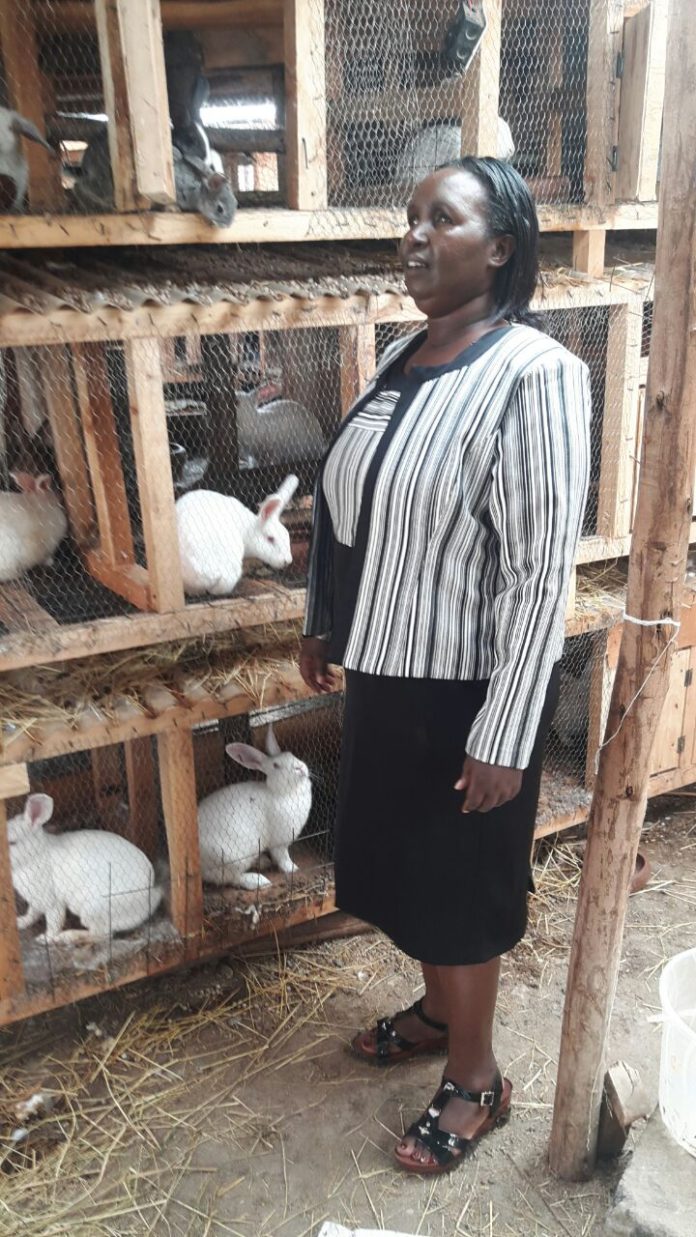By Philomena Gitau
For many years Rabbit rearing has been one of the most shunned agri-business and has always been confined to the youth in the popular 4-k Club members and some young farmers. Others have never thought of it as a business venture that would bring money to their pockets as many considered working on it as a hobby.
As for the rabbit meat, many are hesitant to accept it as a delicacy in their kitchen or even part of their menu. In many Kenyan cultures, rabbit meat is seen as a meal for the young boys.
Today, the value for rabbit meat has been realized, according to Alex Gathii, a renowned farmer “The fact that these are times of high population growth and pressure on hand, rabbits help overcome the ever increasing animal protein shortage”, he says.

According to Alex, rabbits can be kept under simple, low input conditions. They are excellent feed converters of green waste products and do not compete with agricultural food production for consumption. This makes the project a viable business for both small-scale and commercial large industry.
We met Florence Nyagah, a visually impaired rabbit farmer in Ruai-Nairobi who also doubles up as the Roysambu Sub-County Administrator for persons with disability. She’s the founder of Acacia Rabbit Farmers Association. Florence is a graduate with a Bachelor of Arts Degree and a Master’s Degree holder in Counselling Psychology from Kenyatta University.
In 2005, Florence developed a condition of pressure in the eyes which caused her blindness, but that has not hindered her from doing something she has loved doing since her childhood and that is farming “I have always loved farming since I was a little girl” she says.
Florence started keeping rabbits in 2016 with 2 female rabbits and 1 male. Before that, she was rearing chicken but they weren’t giving her good returns “Chicken really disappointed me, but someone encouraged me to try rabbits and I gave it a chance. So far so good”, she said.
She has more than 400 rabbits in her Ruai home. Her story of determination, resilience, and excellence has stirred an interest in many people of starting the business. She is also a counselor especially to persons living with various disabilities. “There’s a show I recently did on a local television station and since that time I’ve received numerous calls from people asking how they can start, and I am very ready to help”, she says.
The huge number of interested people made her think of an association where rabbit farmers would come together and share their journeys and ideas on how to best do it. That’s when she formed Acacia Rabbit Farmers Association of Kenya early this year. The association is open to everyone all over Kenya, so long as one is interested in the Rabbit business.
So far, the association has about 60 registered members and more are still joining. When asked a majority of them say they were motivated by Florence’s story to start the business.

Margaret Njeri who was inspired by Florence on TV says “When I saw and heard Florence speak on Television, I was very encouraged since I had started rearing rabbits but got discouraged along the way. I’ll give it another try”. The members are privileged to have Alex Gathii take them through the basics and fundamentals of rabbit farming and what it entails.
Anyone can rear rabbits as the capital is very affordable and the returns are favorable. “One rabbit costs Ksh. 3,500, so you just need about Ksh. 10,500 for 2 female and 1 male to start”, says Florence.
Compared to chicken or any other livestock animal, Florence notes that rabbits grow very fast if fed well-reaching maturity at 6 months, they require less space, are very adaptable to different feedings and holding conditions, can thrive entirely on plants and kitchen waste. Something interesting to note is that their urine is very expensive. It’s actually the best organic fertilizer which is composed of Ammonia, Urea, and Nitrogen because it is highly concentrated before using.
Rabbit production also provides an income through sales of meat, manure, fur, and skin. However, there’s a challenge of the supply of rabbits being very low while the demands are high. The level of management is generally low with respect to housing, feeding and disease control aspects. The main source of feed is farm products and palatable weeds and also pellets bought from animal feed products shops.
“Rabbits are quick and very prolific breeders. Their white meat is of high quality and it
competes with that of chicken and fish”, says Alex.














